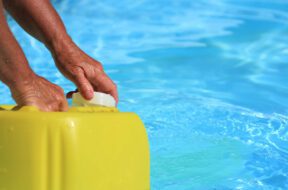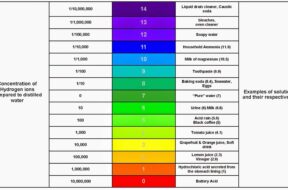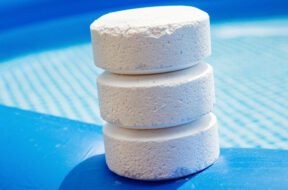
Want to learn more about algaecide? Read on to find out when to add algaecide to your pool maintenance routine and other helpful tips.
There are plenty of options for pool owners when it comes to treating their water. However, most of the chemicals you can treat with have long names and even longer explanations on what it will do for your pool. One of these chemicals for treatment is borate. We will be focusing on the chemical of borate today. We at Pool Calculator will be touching on what borate is, and why you should be treating your pool with borate.
(Source for information on Borate)
Borate is a chemical compound, consisting of both boron and oxygen. The chemical formula of this compound is BO3. The output of this chemical is a salt that is a multi-functioning asset for swimming pool chemistry. This is due to the fact that borate serves as a buffer between the water and the bacteria that gets into your pool. Borate does a great job regulating your water and keeping it well balanced. What follows are some of the most impactful reasons to treat your water with borate.
This fact about borate is 100% true! Borate serves as a buffer for the pool. This means algae is a lot less likely to form in the water. Algae is annoying for every pool owner, so this is good news. This is due to the most important fact regarding borate; borate helps stabilize the pH of your water (See relationship between Chlorine and pH). Higher pH levels are associated with higher levels of algae in the water, and borate prevents this from happening. This controlled pH level means you won’t need to worry about getting rid of nasty algae.
When your pH level drifts past the level that is considered “normal” (around 7.8), something has to be done to fix it. Chlorine becomes a lot less effective once this pH threshold is reached, allowing bacteria to form. Borate then steps in and counteracts this problem, stabilizing the pH and bringing the value back to a normal number. This treatment has many beneficial perks. The first is preventing algae and calcium scaling on the top of the pool surface. Also, when the pool’s pH level goes below the recommended level the water can start to erode your fixtures. Borate does a good job “regulating” the pH and preventing the water from swaying too far towards being acidic or basic.
Chlorine is a useful tool for pool chemistry, but it has damaging effects. Chlorine in high and direct exposure has been “linked to skin cancers and other harmful diseases” (Source). The more your pH level fluctuates, the greater your need for chlorine treatment. You should want to keep your necessary chlorine treatment to a minimum. This is because more chlorine means more costs, along with the typical side effects it offers. With the use of borate, you can keep your chlorine usage to a minimum, which greatly benefits the swimmers in your pool.
Pool Calculator – Swimming Pool Water Testing Basics
One of the most visible benefits of using borate in the pool is the crystal-clear water. There is a massive difference with borate treatment. This water has a simple chemistry explanation. The chloramine in the pool does not form quickly (because of the use of the borate agent). This means your water will be clear as day, and you will not have to worry about murky water forming in your pool. Borate usage also provides you with “soft water”. Soft water is water without many harmful chemicals. This means that you will not need to worry as much about potential side effects of pool use, such as red eyes, dry and itchy skin, and much more.
Try out our Pool Calculator as you clean and maintain your pool! For more information on how to care for your swimming pool, see our blogs on Pool Maintenance

Want to learn more about algaecide? Read on to find out when to add algaecide to your pool maintenance routine and other helpful tips.

In this quick guide, we’ll answer the question “can you over shock a pool” and unveil the factors to consider when shocking a pool.

Maintaining both pH and total alkalinity in your swimming pool is important for keeping your pool properly sanitized and non-corrosive. Total alkalinity is to pH what cyanuric acid is to free chlorine. Total alkalinity stabilizes pH levels. The ideal pool pH level is 7.4 to 7.6. The ideal total alkalinity level is 80 to 120 ppm.

The Association of Pool and Spa Professionals recommends free chlorine levels for both swimming pools and hot tubs be kept between 2.0 and 4.0 ppm. However, the Center for Disease Control recommends free chlorine stay above 1 ppm in pools and 3 ppm in hot tubs.